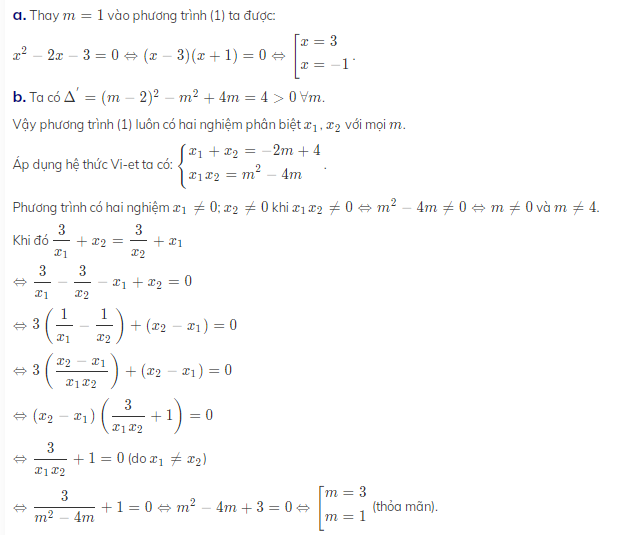Hãy nhập câu hỏi của bạn vào đây, nếu là tài khoản VIP, bạn sẽ được ưu tiên trả lời.

a, Thay m = -1 vào phương trình trên ta được
\(x^2+4x-5=0\)
Ta có : \(\Delta=16+20=36\)
\(x_1=\frac{-4-6}{2}=-5;x_2=\frac{-4+6}{2}=1\)
Vậy với m = -1 thì x = -5 ; x = 1
b, Vì x = 2 là nghiệm của phương trình trên nên thay x = 2 vào phương trình trên ta được :
\(4+8+3m-2=0\Leftrightarrow3m=-10\Leftrightarrow m=-\frac{10}{3}\)
Vậy với x = 2 thì m = -10/3
c, Để phương trình có 2 nghiệm phân biệt thì \(\Delta>0\)hay
\(16-4\left(3m-2\right)=16-12m+8=4m+8>0\)
\(\Leftrightarrow8>-4m\Leftrightarrow m>-2\)
Theo Vi et ta có : \(\hept{\begin{cases}x_1+x_2=-\frac{b}{a}=-4\\x_1x_2=\frac{c}{a}=3m-2\end{cases}}\)
\(\Leftrightarrow x_1+x_2=-4\Leftrightarrow x_1=-4-x_2\)(1)
suy ra : \(-4-x_2+2x_2=1\Leftrightarrow-4+x_2=1\Leftrightarrow x_2=5\)
Thay vào (1) ta được : \(x_1=-4-5=-9\)
Mà \(x_1x_2=3m-2\Rightarrow3m-2=-45\Leftrightarrow3m=-43\Leftrightarrow m=-\frac{43}{3}\)

a: Thay m=-5 vào (1), ta được:
\(x^2+2\left(-5+1\right)x-5-4=0\)
\(\Leftrightarrow x^2-8x-9=0\)
=>(x-9)(x+1)=0
=>x=9 hoặc x=-1
b: \(\text{Δ}=\left(2m+2\right)^2-4\left(m-4\right)=4m^2+8m+4-4m+16=4m^2+4m+20>0\)
Do đó: Phương trình luôn có hai nghiệm phân biệt
\(\dfrac{x_1}{x_2}+\dfrac{x_2}{x_1}=-3\)
\(\Leftrightarrow x_1^2+x_2^2=-3x_1x_2\)
\(\Leftrightarrow\left(x_1+x_2\right)^2+x_1x_2=0\)
\(\Leftrightarrow\left(2m+2\right)^2+m-4=0\)
\(\Leftrightarrow4m^2+9m=0\)
=>m(4m+9)=0
=>m=0 hoặc m=-9/4

\(\Delta=9-4m>0\Rightarrow m< \dfrac{9}{4}\)
Theo hệ thức Viet: \(\left\{{}\begin{matrix}x_1+x_2=3\\x_1x_2=m\end{matrix}\right.\)
\(\sqrt{x_1^2+1}+\sqrt{x_2^2+1}=3\sqrt{3}\)
\(\Leftrightarrow x_1^2+x_2^2+2+2\sqrt{\left(x_1^2+1\right)\left(x_2^2+1\right)}=27\)
\(\Leftrightarrow\left(x_1+x_2\right)^2-2x_1x_2+2\sqrt{\left(x_1x_2\right)^2+\left(x_1+x_2\right)^2-2x_1x_2+1}=25\)
\(\Leftrightarrow9-2m+2\sqrt{m^2+9-2m+1}=25\)
\(\Leftrightarrow\sqrt{m^2-2m+10}=m+8\left(m\ge-8\right)\)
\(\Leftrightarrow m^2-2m+10=m^2+16m+64\)
\(\Rightarrow m=-3\) (thỏa mãn)
Pt trên có a=1, b=5, c=-3m+2
\(\Delta=b^2-4ac=25-4\cdot1\cdot\left(-3m+2\right)=17+12m\)
Để pt có hai nghiệm phân biệt thì \(\Delta>0\)<=> 17+12m >0 <=>m> 17/12
Theo hệ thức Viet, ta có:
\(\hept{\begin{cases}x_1+x_2=-5\\x_1\cdot x_2=-3m+2\end{cases}}\)
\(\left(x_1-x_2\right)^2=\left(x_1+x_2\right)^2-4x_1\cdot x_2=25-4\left(-3m+2\right)=17+12m=10\)
=> 12m = -7 <=>m=-7/12 (thỏa đkxđ)
Vậy với m=-7/12 thì phương trình có hai nghiệm x1, x2 thỏa (x1 - x2)^2 =10

a: Khi m=-1 thì pt sẽ là \(x^2-\left(-1+2\right)x-\left(-1\right)-3=0\)
\(\Leftrightarrow x^2-x-2=0\)
=>x=2 hoặc x=-1
b: \(\Delta=\left(m+2\right)^2-4\left(-m-3\right)\)
\(=m^2+4m+4+4m+12\)
\(=m^2+8m+16=\left(m+4\right)^2\)
=>Phương trình luôn có hai nghiệm
Theo đề, ta có: \(\left(x_1+x_2\right)^2-2x_1x_2>1\)
\(\Leftrightarrow\left(m+2\right)^2-2\left(-m-3\right)>1\)
\(\Leftrightarrow m^2+4m+4+2m+6-1>0\)
\(\Leftrightarrow\left(m+3\right)^2>0\)
=>m<>-3

(a) Khi \(m=2,\left(1\right)\Leftrightarrow x^2-4x-5=0\left(2\right)\).
Phương trình (2) có \(a-b+c=1-\left(-4\right)+\left(-5\right)=0\)
\(\Rightarrow\left[{}\begin{matrix}x=-1\\x=-\dfrac{c}{a}=5\end{matrix}\right.\).
Vậy: Khi \(m=2,S=\left\{-1;5\right\}\).
(b) Điều kiện: \(x_1,x_2\ne0\Rightarrow m\in R\)
Phương trình có nghiệm khi:
\(\Delta'=\left(-m\right)^2-1\cdot\left(-m^2-1\right)\ge0\)
\(\Leftrightarrow2m^2+1\ge0\left(LĐ\right)\)
Suy ra, phương trình (1) có nghiệm với mọi \(m\).
Theo định lí Vi-ét: \(\left\{{}\begin{matrix}x_1+x_2=-\dfrac{b}{a}=2m\\x_1x_2=\dfrac{c}{a}=-m^2-1\end{matrix}\right.\)
Theo đề: \(\dfrac{x_1}{x_2}+\dfrac{x_2}{x_1}=-\dfrac{5}{2}\)
\(\Leftrightarrow\dfrac{x_1^2+x_2^2}{x_1x_2}=-\dfrac{5}{2}\Leftrightarrow\dfrac{\left(x_1+x_2\right)^2-2x_1x_2}{x_1x_2}=-\dfrac{5}{2}\)
\(\Leftrightarrow2\left(x_1+x_2\right)^2+x_1x_2=0\)
\(\Leftrightarrow2\left(2m\right)^2+\left(-m^2-1\right)=0\)
\(\Leftrightarrow7m^2=1\Leftrightarrow m=\pm\dfrac{\sqrt{7}}{7}\) (thỏa mãn).
Vậy: \(m=\pm\dfrac{\sqrt{7}}{7}.\)
bạn giải thích kĩ hộ mik vói cái <=> cuối cùng sao ra như vậy


a,Thay m=2 vào pt :
\(\left(1\right)\Leftrightarrow x^2-4x+3=0\\ \Leftrightarrow\left[{}\begin{matrix}x=1\\x=3\end{matrix}\right.\)
b, Để pt có 2 nghiệm thì \(\Delta'\ge0\)
\(\Leftrightarrow\left(-2\right)^2-1\left(m+1\right)\ge0\\ \Leftrightarrow4-m-1\ge0\\ \Leftrightarrow3-m\ge0\\ \Leftrightarrow m\le3\)
Theo Vi-ét:\(\left\{{}\begin{matrix}x_1+x_2=4\\x_1x_2=m+1\end{matrix}\right.\)
\(x^2_1+x^2_2=5\left(x_1+x_2\right)\\ \Leftrightarrow\left(x_1+x_2\right)^2-2x_1x_2=5.4\\ \Leftrightarrow4^2-2\left(m+1\right)=20\\ \Leftrightarrow16-2m-2-20=0\\ \Leftrightarrow m=-3\left(tm\right)\)
a)Thay \(m=2\) vào (1) ta đc:
\(x^2-4x+2+1=0\Rightarrow x^2-4x+3=0\)
\(\Rightarrow\left(x-3\right)\left(x-1\right)=0\)
\(\Rightarrow\left[{}\begin{matrix}x=3\\x=1\end{matrix}\right.\)
b)Áp dụng hệ thức Viet:
\(\left\{{}\begin{matrix}x_1+x_2=-\dfrac{b}{a}=\dfrac{4}{1}=4\\x_1\cdot x_2=\dfrac{c}{a}=m+1\end{matrix}\right.\) (*)
Theo bài: \(x_1^2+x^2_2=5\left(x_1+x_2\right)\)
\(\Rightarrow\left(x_1+x_2\right)^2-2x_1\cdot x_2=5\left(x_1+x_2\right)\)
\(\Rightarrow4^2-2\cdot\left(m+1\right)=5\cdot4\)
\(\Rightarrow m=-1\)

a. Bạn tự giải
b. Để pt có 2 nghiệm trái dấu
\(\Leftrightarrow ac< 0\Leftrightarrow m+1< 0\Rightarrow m< -1\)
c. Đề bài có vẻ ko chính xác, sửa lại ngoặc sau thành \(x_2\left(1-2x_1\right)...\)
\(\Delta'=\left(m+2\right)^2-4\left(m+1\right)=m^2\ge0\) ; \(\forall m\)
\(\Rightarrow\) Pt đã cho luôn luôn có nghiệm
Theo hệ thức Viet: \(\left\{{}\begin{matrix}x_1+x_2=2\left(m+2\right)\\x_1x_2=m+1\end{matrix}\right.\)
\(x_1\left(1-2x_2\right)+x_2\left(1-2x_1\right)=m^2\)
\(\Leftrightarrow x_1+x_2-4x_1x_2=m^2\)
\(\Leftrightarrow2\left(m+2\right)-4\left(m+1\right)=m^2\)
\(\Leftrightarrow m^2+2m=0\Rightarrow\left[{}\begin{matrix}m=0\\m=-2\end{matrix}\right.\)


a: Thay m=2 vào (1), ta được:
\(x^2-3x+2=0\)
=>(x-1)(x-2)=0
=>\(\left[{}\begin{matrix}x-1=0\\x-2=0\end{matrix}\right.\)
=>\(\left[{}\begin{matrix}x=1\\x=2\end{matrix}\right.\)
b: \(\text{Δ}=\left(-3\right)^2-4m=9-4m\)
Để phương trình (1) có nghiệm thì Δ>=0
=>-4m+9>=0
=>-4m>=-9
=>\(m< =\dfrac{9}{4}\)
c: Theo Vi-et, ta có:
\(\left\{{}\begin{matrix}x_1+x_2=-\dfrac{b}{a}=3\\x_1x_2=\dfrac{c}{a}=m\end{matrix}\right.\)
\(x_1^3\cdot x_2+x_1\cdot x_2^3-2\cdot x_1^2\cdot x_2^2=5\)
=>\(x_1x_2\left(x_1^2+x_2^2-2x_1x_2\right)=5\)
=>\(m\cdot\left[\left(x_1+x_2\right)^2-4x_1x_2\right]=5\)
=>\(m\cdot\left[3^2-4m\right]=5\)
=>\(m\left(-4m+9\right)-5=0\)
=>\(-4m^2+9m-5=0\)
=>(m-1)(4m-5)=0
=>\(\left[{}\begin{matrix}m=1\left(nhận\right)\\m=\dfrac{5}{4}\left(nhận\right)\end{matrix}\right.\)